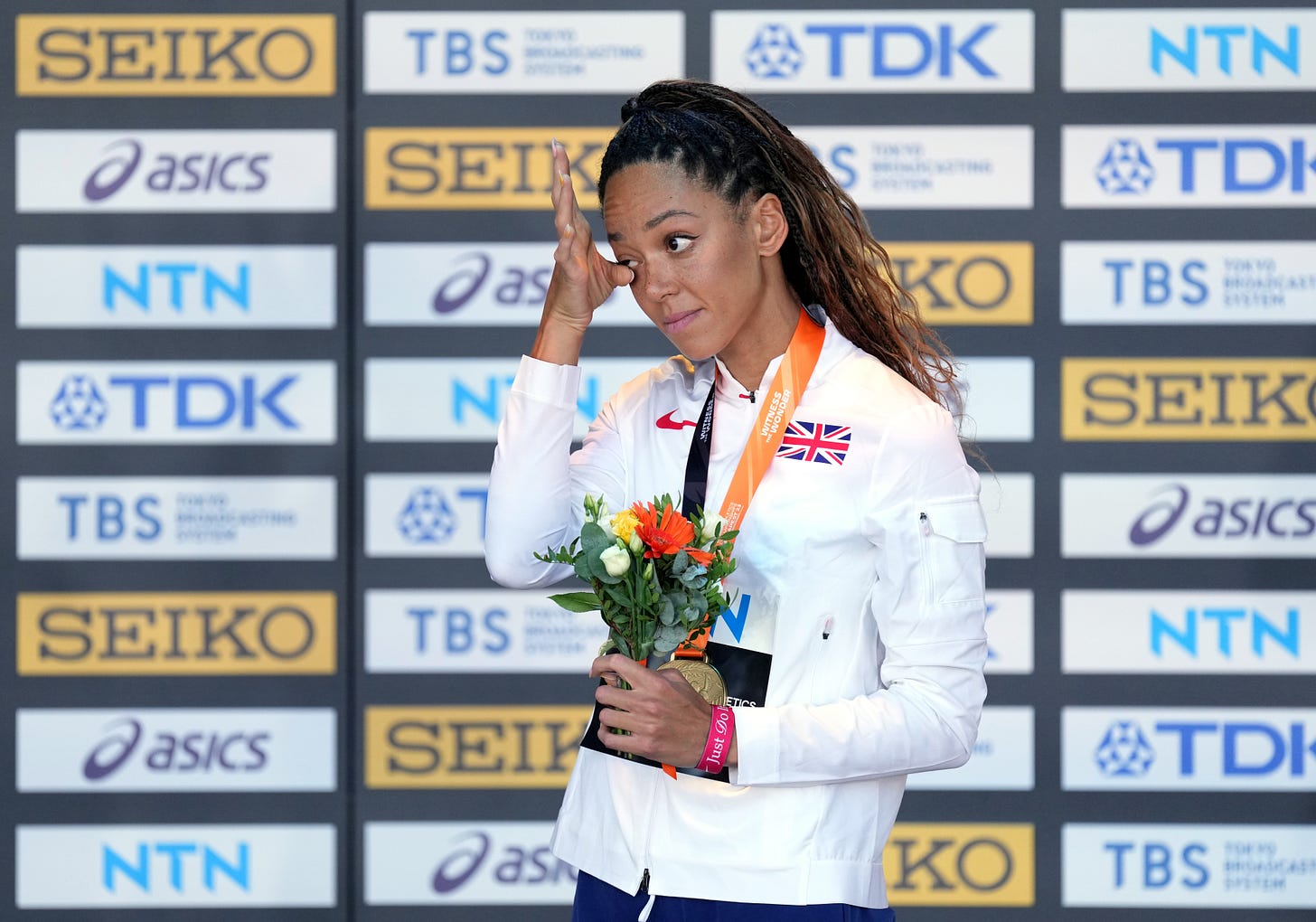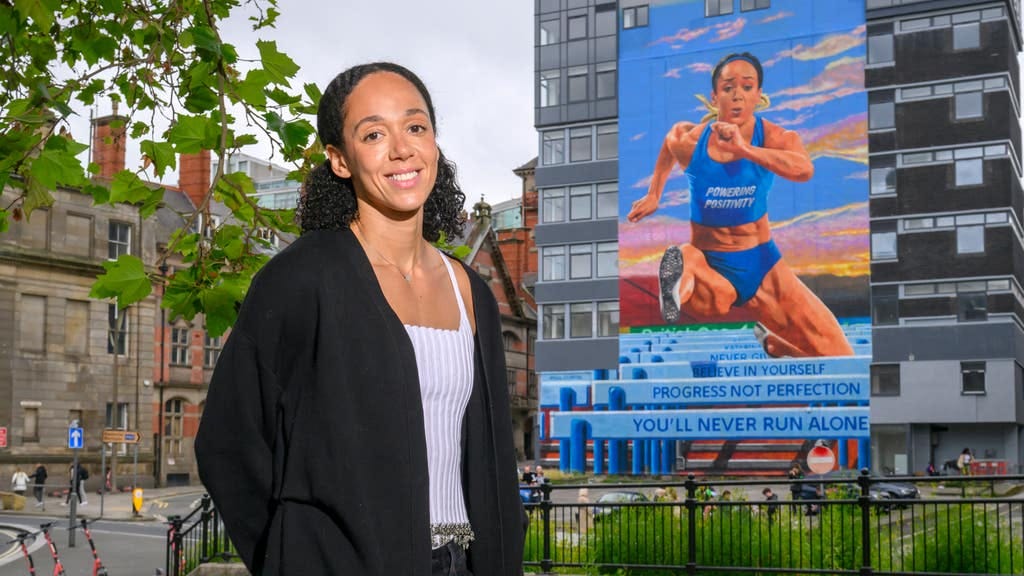Katarina Johnson-Thompson: I’ve learnt loads from facing low moments
"I don’t think they should be called ‘failures’, because you learn so much from being down and out,” the team GB heptathlete said.
With the Paris Games weeks away, the heptathlete talks about overcoming injuries and why the setbacks ultimately helped her progress.
Team GB athlete Katarina Johnson-Thompson believes we need to change how we view ‘failure’ and says her successes may not have happened without facing setbacks along the way.
“I feel like some of the failures I’ve had definitely forced me to change certain things that weren’t working, and then helped me have the achievements that I’ve had,” says the Liverpool-born Team GB heptathlete.
“I don’t think I would have had the achievements I’ve had without the failures that have happened. So, it’s so important – and I don’t think they should be called ‘failures’, because you learn so much from being down and out.”
The 31-year-old, who made her Olympics debut at the London 2012 games, finishing 13th, and in 2016 competed at Rio, finishing sixth. In 2019 she scooped her first World Championship title, but a nasty Achilles injury the following year brought setbacks. While she did manage to recover and make it to the Tokyo Games, another injury (this time a calf tear) while there forced her to pull out of the event.
Last year, though, Johnson-Thompson landed her first world title in four years at the 2023 World Athletics Championships in Budapest. Now with the Paris 2024 Games just a few weeks away, how is she feeling about returning to the Olympics arena?
“I’m feeling good,” she says. “I don’t think I can be doing anything differently. I feel like I’m giving myself the best chance, and that’s ultimately the only thing that I want to have. When I step on the line, I just want to be healthy and happy and to have a chance at going for a medal.”
Injury setbacks are a painful and sometimes devastating reality for all athletes. But now on the other side of those challenges, Johnson-Thompson acknowledges it’s part of the journey – and this applies in all areas of life.
“I feel like I’m giving myself the best chance, and that’s ultimately the only thing that I want to have.”
- Katarina Johnson-Thompson
“Even this year, I’ve learnt loads from low moments. And it’s very telling – you have those moments for a reason,” she says. “And when you’re in them, it’s hard, and you need to allow yourself to feel those emotions. But then afterwards, you’ve got to make some changes, you know? In order for it not to happen again. And that’s a good thing that comes from it.”
A 30×10-metre mural of the heptathlete has just been unveiled in her home city of Liverpool, created by local artist Paul Curtis and commissioned by British Gas. It forms part of a bigger campaign to promote sustainable energy use and support communities through sport – and depicts Johnson-Thompson leaping over hurdles with motivational phrases painted across them, including ‘progress not perfection’ and ‘never give up’.
In a survey of 2,000 adults commissioned by British Gas, 72% admitted they’ve struggled to find the drive to get more active, with lack of motivation among the top barriers getting in the way. However, nearly half (41%) also said receiving words of encouragement was the most effective method of motivating, followed by setting clear goals and being surrounded by a supportive environment (both 31%).
“It’s a really close to home campaign. I was really blown away with it when it got unveiled to me, it’s definitely close to my heart,” Johnson-Thompson says today.
“I think it’s very easy for athletes to have motivation, because we are tied by time restraints – like I’ve known that this Olympics [the Paris Summer Games, starting later this month] is going to be on this [particular] day for about three years now. I think having to motivate yourself for that is quite easy, but I think it’s hard to motivate yourself when you’re facing problems and obstacles and hurdles that were unexpected. It’s hard to bounce back from that.
“So I feel like it’s really cool to see the mural and the words of wisdom. For example, ‘progress not perfection’, which is really close to home, especially as a heptathlete as well. It has felt like just that little bit of progress every day for me – that’s how I motivate myself.
“You just have to do the best you can each day, and then at the end of it, you’ve got no regrets.”

She is no stranger to having to push through days when everything feels like a slog.
“I think I face that all the time, to be honest, I feel like nothing ever goes to plan,” Johnson-Thompson laughs.
“I overcome it by just controlling what I can control. And that’s always my attitude. What I think about the night before, what am I going to do tomorrow? What can I do to help prep myself or make my future life a little bit easier? It’s very easy as an athlete to have all these little, tiny goals – it’s just about following through on what you’ve promised yourself.”
Has how she handles pressure changed over the years?
“The pressure – obviously it’s real, and it feels real when you’re feeling that emotion. But at the same time, I think it’s something that you can create for yourself. Other people can’t create anything for you, it’s ultimately what you feel yourself,” she says.
“So, if you change that pressure feeling into something else – like my coach always says, nervousness and excitement have the same feeling, it’s the same feeling that your body produces. So it’s not about seeing it as pressure, but seeing it as people who believe in you, [who believe] that you can actually win – it’s not that you ‘should’ or you ‘have’ to win.
“I feel like changing the wording of things is really important,” she adds. “What you tell yourself is really important.”



